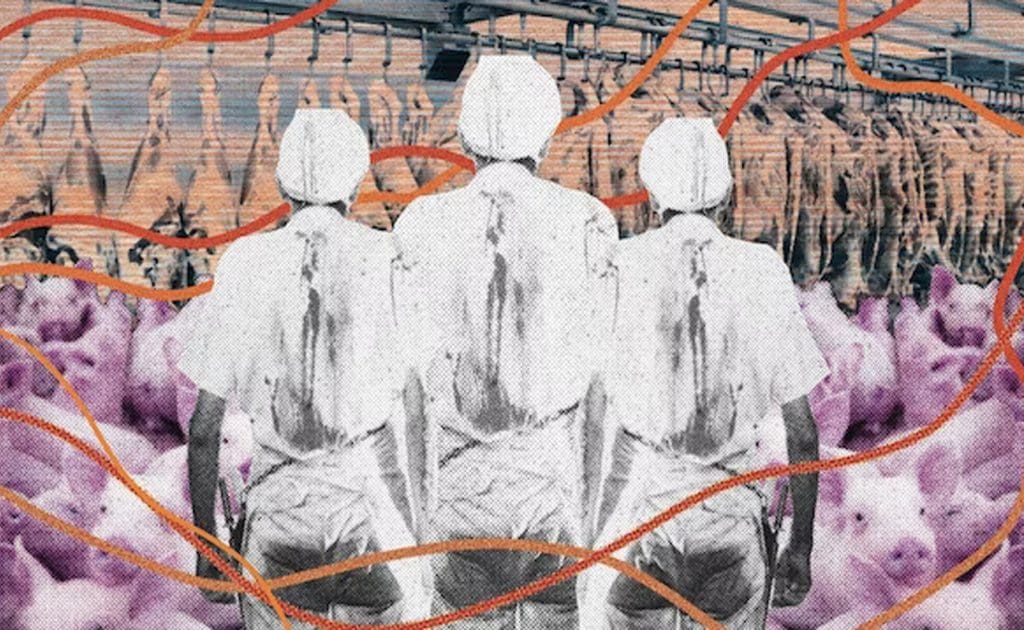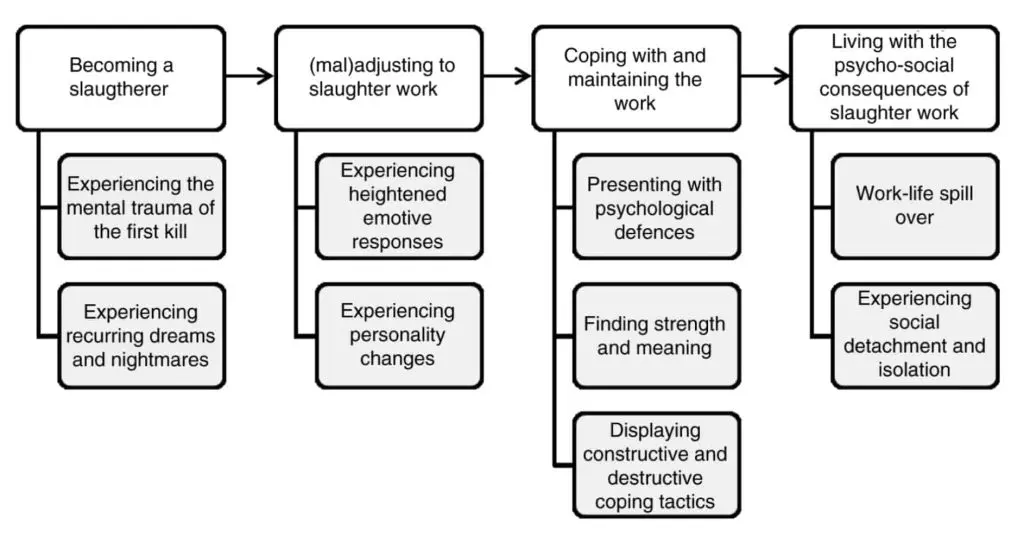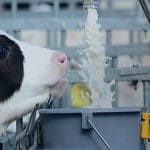Animal agriculture is an integral part of our global food system, providing us with essential sources of meat, dairy, and eggs. However, behind the scenes of this industry lies a deeply concerning reality. The workers in animal agriculture face immense physical and emotional demands, often working in harsh and dangerous environments. While the focus is often on the treatment of animals in this industry, the mental and psychological toll on the workers is often overlooked. The repetitive and arduous nature of their work, coupled with the constant exposure to animal suffering and death, can have a profound impact on their mental well-being. This article aims to shed light on the psychological toll of working in animal agriculture, exploring the various factors that contribute to it and its implications on the workers’ mental health. Through examining the existing research and speaking to workers in the industry, we aim to bring attention to this often-neglected aspect of the animal agriculture industry and highlight the need for better support and resources for these workers.
Moral injury: the hidden trauma of animal agriculture workers.
Working in animal agriculture can have profound and far-reaching consequences on the mental health and well-being of its workers. An exploration of the mental health impacts on workers in factory farms and slaughterhouses reveals the existence of conditions such as PTSD and moral injury. The relentless exposure to violence, suffering, and death takes a toll on the psyche, leading to lasting psychological trauma. The concept of moral injury, which refers to the psychological distress caused by actions that violate one’s moral or ethical code, is particularly pertinent in this context. The routine practices inherent in animal agriculture often require workers to engage in actions that conflict with their deeply held values and compassion for animals. This internal conflict and dissonance can lead to profound feelings of guilt, shame, and self-condemnation. To address these significant mental health impacts, it is crucial to recognize the systemic nature of the issue and advocate for a transformative change in food production that prioritizes the well-being of both animals and workers alike.
PTSD in slaughterhouse employees: a prevalent but overlooked issue.
An area of particular concern within the realm of mental health impacts on workers in animal agriculture is the prevalence of post-traumatic stress disorder (PTSD) among slaughterhouse employees. Despite being a prevalent issue, it often remains overlooked and disregarded. The repeated exposure to traumatic events, such as witnessing animal suffering and engaging in violent acts, can lead to the development of PTSD. Symptoms may include intrusive memories, nightmares, hypervigilance, and avoidance behaviors. The nature of the work, combined with long hours and intense pressures, creates an environment that is conducive to the development of PTSD. This overlooked issue highlights the urgent need for a systemic change in food production practices, with a focus on implementing humane and ethical approaches that prioritize the mental well-being of those involved in the industry. By addressing the root causes and providing support for affected employees, we can create a more compassionate and sustainable future for both humans and animals alike.
The psychological cost of commodifying animals in factory farms.
The psychological cost of commodifying animals in factory farms extends beyond the impact on workers’ mental health. The very act of treating animals as mere commodities in these industrialized systems can inflict moral injury on those involved in the process. Moral injury refers to the psychological distress that arises from engaging in acts that contradict personal values and moral beliefs. Factory farm workers are often faced with the ethical dilemma of participating in practices that cause immense suffering and disregard animal welfare. This internal conflict can lead to feelings of guilt, shame, and a deep sense of moral distress. It is imperative that we recognize the systemic and structural factors contributing to this commodification, and work towards a more compassionate and sustainable approach to food production. By shifting towards ethical and humane practices, we can not only improve the well-being of animals but also alleviate the psychological burden on workers, fostering a healthier and more sustainable food system for all.
Workers face ethical dilemmas daily.
In the challenging environment of animal agriculture, workers are confronted with ethical dilemmas on a daily basis. These dilemmas arise from the inherent tension between their personal values and the demands of their job. Whether it is the confinement and mistreatment of animals, the use of harmful chemicals, or the disregard for environmental sustainability, these workers are exposed to situations that can profoundly impact their mental well-being. The continuous exposure to such moral conflicts can lead to psychological issues, including post-traumatic stress disorder (PTSD) and moral injury. These workers, who often experience the harsh realities of the industry firsthand, are not only subjected to physical hardships but also bear the weight of their moral choices. It is essential that we acknowledge and address these ethical dilemmas, advocating for a systemic change in food production that prioritizes the well-being of both animals and workers. By fostering a more compassionate and sustainable approach, we can alleviate the psychological toll on those involved in animal agriculture while striving towards a more ethical and humane industry.

From desensitization to mental breakdowns.
An exploration of the mental health impacts on workers in factory farms and slaughterhouses reveals a disturbing trajectory from desensitization to potential mental breakdowns. The grueling and repetitive nature of their work, coupled with exposure to extreme violence and suffering, can gradually desensitize workers to the inherent cruelty of the industry. Over time, this desensitization can erode their empathy and emotional well-being, leading to a dissociation from their own emotions and the suffering they witness. This detachment can take a toll on their mental health, potentially resulting in increased rates of depression, anxiety, and even suicidal ideation. The psychological toll of working in animal agriculture is profound, highlighting the urgent need for a systemic change in food production that prioritizes the ethical treatment of animals and the mental well-being of workers.
Sustainable food production as a solution.
Adopting sustainable food production practices offers a viable solution to address the profound psychological toll experienced by workers in factory farms and slaughterhouses. By shifting towards more humane and ethical approaches, such as regenerative agriculture and plant-based alternatives, we can reduce the exposure of workers to the extreme violence and suffering inherent in the animal agriculture industry. Additionally, sustainable farming practices promote a healthier and more equitable environment for workers, fostering a sense of purpose and satisfaction in their work. Emphasizing sustainable food production not only benefits the mental well-being of workers, but also contributes to the overall improvement of our food system, creating a healthier and more compassionate world for all stakeholders involved.
The need for systemic change.
To truly address the mental health impacts experienced by workers in factory farms and slaughterhouses, it is imperative that we recognize the need for systemic change in our food production systems. The current industrialized model prioritizes profits over the well-being of workers, animals, and the environment, perpetuating a cycle of trauma and moral injury. By focusing on short-term gains and efficiency, we overlook the long-term consequences on the mental health of those directly involved in the industry. It is time to challenge this unsustainable paradigm and advocate for a comprehensive shift towards a more compassionate and sustainable food system. This requires reimagining the entire supply chain, from farm to fork, and implementing regulations and policies that prioritize worker safety, animal welfare, and environmental sustainability. Only through systemic change can we hope to alleviate the psychological toll on workers and create a truly ethical and resilient food production system for the future.
Addressing mental health in agriculture.
An exploration of the mental health impacts on workers in animal agriculture reveals a pressing need to address the well-being of individuals engaged in this industry. The demanding nature of work in factory farms and slaughterhouses exposes workers to a range of stressors that can lead to adverse mental health outcomes. Post-Traumatic Stress Disorder (PTSD) and moral injury are among the psychological challenges faced by these individuals. PTSD may result from exposure to distressing events, such as witnessing animal cruelty or engaging in euthanasia practices. Additionally, the moral injury experienced by workers stems from the conflict between personal values and the demands of their job, causing significant psychological distress. To mitigate these mental health impacts, it is crucial to advocate for a systemic change in food production that prioritizes the well-being of workers, promotes ethical treatment of animals, and ensures sustainable practices. By implementing comprehensive support systems, fostering worker empowerment, and creating a culture of compassion, we can address the mental health challenges faced by those in animal agriculture and pave the way for a more humane and sustainable industry.

Empathy for both animals and workers.
Within the context of the psychological toll experienced by workers in animal agriculture, it is essential to cultivate empathy not only towards the workers themselves but also towards the animals involved. Recognizing the interconnectedness of their experiences can lead to a more comprehensive understanding of the industry’s inherent challenges. By fostering a culture of empathy, we acknowledge the emotional strain placed on workers who may be compelled to perform tasks that contradict their personal values. Simultaneously, we recognize the need for compassion towards the animals who are subjected to potentially traumatic and inhumane conditions. Empathy for both animals and workers serves as a foundation for advocating for a systemic change in food production that prioritizes the mental well-being of individuals while promoting ethical treatment of animals. By addressing the well-being of both stakeholders, we can work towards creating a more harmonious and sustainable future for all involved in the industry.
Creating a healthier food system.
To address the mental health impacts on workers in factory farms and slaughterhouses, as well as promote overall well-being and ethical treatment of animals, it is imperative to explore the creation of a healthier food system. This entails implementing sustainable and humane practices throughout the entire food production process, from farm to table. By prioritizing regenerative farming techniques, reducing the reliance on chemical inputs, and promoting organic and locally sourced produce, we can minimize the environmental and health risks associated with conventional agriculture. Additionally, supporting small-scale farmers who prioritize animal welfare and implementing stricter regulations on industrial farming operations can help ensure that workers are not exposed to traumatic and hazardous conditions. Furthermore, promoting consumer education and awareness about the benefits of a plant-based diet can encourage a shift towards more sustainable and compassionate food choices. Creating a healthier food system is not only essential for the well-being of workers and animals involved, but also for the long-term sustainability and resilience of our planet.
In conclusion, the psychological toll of working in animal agriculture cannot be ignored. It is a complex issue that impacts not only the workers, but also the animals and the environment. It is crucial for companies and policymakers to address the mental health and well-being of those in the industry, in order to create a more sustainable and ethical future for all. As consumers, we also play a role in supporting humane and responsible practices in animal agriculture. Let us work together towards a better and more compassionate world for both humans and animals.

FAQ
How does working in animal agriculture impact the mental health of individuals involved in the industry?
Working in animal agriculture can have both positive and negative impacts on the mental health of individuals involved in the industry. On one hand, being in close contact with animals and experiencing the satisfaction of caring for and raising them can be fulfilling and bring a sense of purpose. However, the demanding nature of the job, long hours, and exposure to stressful situations such as animal illnesses or deaths can contribute to increased stress, anxiety, and burnout. Additionally, the ethical concerns surrounding animal agriculture can also weigh on the mental well-being of individuals working in the industry. Overall, it is important to prioritize mental health support and resources for those involved in animal agriculture.
What are some common psychological challenges faced by workers in animal agriculture, such as slaughterhouse employees or factory farm workers?
Some common psychological challenges faced by workers in animal agriculture include experiencing stress, trauma, and moral distress. Slaughterhouse employees often cope with the emotional toll of killing animals daily, which can lead to anxiety, depression, and post-traumatic stress disorder (PTSD). Factory farm workers may face ethical conflicts and cognitive dissonance when witnessing animal cruelty and inhumane practices. They may also face job insecurity, physically demanding work conditions, and social isolation, which can contribute to mental health issues. Addressing these challenges requires providing support systems, mental health resources, and implementing more humane practices in the industry.
Are there any specific psychological disorders or conditions that are more prevalent among individuals working in animal agriculture?
There is limited research on the specific psychological disorders or conditions that are more prevalent among individuals working in animal agriculture. However, the nature of the job, such as long hours, physical demands, and exposure to stressful situations, can contribute to mental health challenges. These may include increased rates of stress, anxiety, depression, and post-traumatic stress disorder (PTSD). Additionally, the ethical and moral dilemmas associated with animal agriculture can also impact psychological well-being. It is essential to further explore and address the mental health needs of individuals in this industry to provide adequate support and resources.
How does the emotional stress of working in animal agriculture affect workers’ personal lives and relationships?
The emotional stress of working in animal agriculture can have a significant impact on workers’ personal lives and relationships. The demanding nature of the job, witnessing animal suffering, and dealing with the ethical dilemmas inherent in the industry can lead to emotional exhaustion, anxiety, and depression. This can strain relationships with family and friends, as well as affect the ability to engage in social activities or maintain a healthy work-life balance. The moral conflicts and emotional burden can also lead to feelings of isolation and detachment, making it challenging to form and sustain meaningful connections outside of work.
What are some potential strategies or interventions that can be implemented to mitigate the psychological toll of working in animal agriculture?
Implementing strategies such as increasing awareness and education about the ethical and environmental impacts of animal agriculture, providing mental health support resources and counseling services for workers, promoting a positive and supportive work environment, and offering alternatives and opportunities for workers to transition to more sustainable and ethical industries can help mitigate the psychological toll of working in animal agriculture. Additionally, supporting and advocating for improved animal welfare standards and implementing sustainable farming practices can help alleviate the moral distress experienced by workers in this industry.



